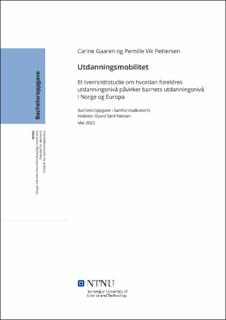Utdanningsmobilitet
Bachelor thesis
Permanent lenke
https://hdl.handle.net/11250/3002395Utgivelsesdato
2022Metadata
Vis full innførselSamlinger
Sammendrag
De økonomiske ulikhetene i samfunnet er økende, og et forsøk på å legitimere dette er at det eksisterer perfekt sosial mobilitet. Denne oppgaven vil undersøke hvor sterk den sosiale mobiliteten i Norge og Europa er ved å ta utgangspunkt i hvordan foreldrenes utdanningsnivå påvirker individets valg av utdanning. For å besvare spørsmålet benytter oppgaven datasettet fra European Social Survey runde 9. Ved hjelp av en multippel regresjonsmodell søker vi å forklare hvordan mors utdanning, fars utdanning, kjønn og alder påvirker individets utdanning. Ved å sammenligne dette på tvers av land forklarer vi også ulike velferdstyper sin påvirkning på valg av utdanning. Oppgaven vil også presentere relevant teori om faktorer som påvirker utdanningsmobilitet og analysere resultatene i lys av dette. Hovedfunnene i oppgaven er at sosial mobilitet ikke er perfekt verken i Norge eller Europa, men den sosiale mobiliteten er relativt høyere i Norden. The economic inequalities in the society are increasing, and an attempt to legitimize this is arguing for perfect social mobility. This thesis will examine how strong the social mobility in Norway and Europe is by analyzing how the parents' level of education affects the individual's choice of education. To answer the question, the thesis utilize the dataset from the European Social Survey round 9. Using a multiple regression model, we seek to explain how the mother's education, father's education, gender and age affect the child's education. By comparing this across countries, we also explain the different types of welfare's impact on the choice of education. The thesis will also present relevant theory on factors that affect educational mobility and analyze the results in light of this. The main findings of the thesis are that social mobility is not perfect in neither Norway nor Europe, but social mobility is relatively higher in the Nordic countries.
